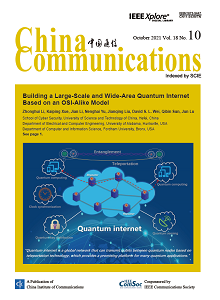System outage probability and diversity analysis of a SWIPT based two-way DF relay network under transceiver hardware impairments
IF 3.1
3区 计算机科学
Q2 TELECOMMUNICATIONS
引用次数: 1
Abstract
This paper investigates the system outage performance of a simultaneous wireless information and power transfer (SWIPT) based two-way decode-and-forward (DF) relay network, where potential hardware impairments (HIs) in all transceivers are considered. After harvesting energy and decoding messages simultaneously via a power splitting scheme, the energy-limited relay node forwards the decoded information to both terminals. Each terminal combines the signals from the direct and relaying links via selection combining. We derive the system outage probability under independent but non-identically distributed Nakagami-m fading channels. It reveals an overall system ceiling (OSC) effect, i.e., the system falls in outage if the target rate exceeds an OSC threshold that is determined by the levels of HIs. Furthermore, we derive the diversity gain of the considered network. The result reveals that when the transmission rate is below the OSC threshold, the achieved diversity gain equals the sum of the shape parameter of the direct link and the smaller shape parameter of the terminal-to-relay links; otherwise, the diversity gain is zero. This is different from the amplify-and-forward (AF) strategy, under which the relaying links have no contribution to the diversity gain. Simulation results validate the analytical results and reveal that compared with the AF strategy, the SWIPT based two-way relaying links under the DF strategy are more robust to HIs and achieve a lower system outage probability.收发器硬件损坏下基于SWIPT的双向DF中继网络系统中断概率和分集分析
本文研究了同时无线信息和功率传输(SWIPT)的双向解码转发(DF)中继网络的系统中断性能,其中考虑了所有收发器的潜在硬件损伤(HIs)。能量限制中继节点通过功率分割方案同时收集能量并解码消息后,将解码信息转发给两个终端。每个终端通过选择组合将来自直接链路和中继链路的信号组合起来。导出了独立但非同分布的Nakagami-m衰落信道下的系统中断概率。它揭示了整体系统上限(OSC)效应,即,如果目标速率超过由HIs水平决定的OSC阈值,系统就会停机。进一步,我们推导了所考虑的网络的分集增益。结果表明:当传输速率低于OSC阈值时,所获得的分集增益等于直接链路形状参数与端中继链路较小形状参数之和;否则,分集增益为零。这与放大转发(AF)策略不同,在AF策略下,中继链路对分集增益没有贡献。仿真结果验证了分析结果,表明与AF策略相比,DF策略下基于SWIPT的双向中继链路对HIs的鲁棒性更强,系统中断概率更低。
本文章由计算机程序翻译,如有差异,请以英文原文为准。
求助全文
约1分钟内获得全文
求助全文
来源期刊

China Communications
工程技术-电信学
CiteScore
8.00
自引率
12.20%
发文量
2868
审稿时长
8.6 months
期刊介绍:
China Communications (ISSN 1673-5447) is an English-language monthly journal cosponsored by the China Institute of Communications (CIC) and IEEE Communications Society (IEEE ComSoc). It is aimed at readers in industry, universities, research and development organizations, and government agencies in the field of Information and Communications Technologies (ICTs) worldwide.
The journal's main objective is to promote academic exchange in the ICTs sector and publish high-quality papers to contribute to the global ICTs industry. It provides instant access to the latest articles and papers, presenting leading-edge research achievements, tutorial overviews, and descriptions of significant practical applications of technology.
China Communications has been indexed in SCIE (Science Citation Index-Expanded) since January 2007. Additionally, all articles have been available in the IEEE Xplore digital library since January 2013.
 求助内容:
求助内容: 应助结果提醒方式:
应助结果提醒方式:


